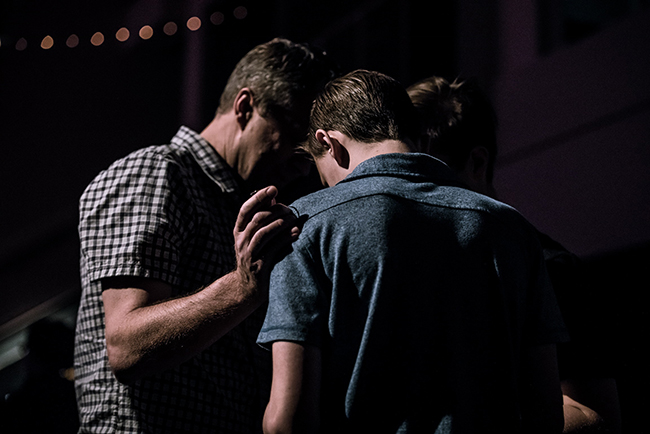
Research shows men’s discipleship lags behind women’s. The power of relationships can help make disciples of men in church.
By Tobin Perry
Dig deep into research about ministry to men in America, and you’ll find both good news and bad.
Despite a spike in 2022 among men who never attend, the gender gap in church attendance has closed in recent years, according to the General Social Survey (GSS). In 2022, there’s a 5-point gap between men (15%) and women (20%) who attend religious services at least weekly. That’s less than half of what it was in the early 1980s.
The gender gap in at least weekly church attendance (20% women, 15% men) has shrunk to less than half of what it was in the early 1980s, according to the GSS. Click To TweetYet men still lag behind women in several discipleship metrics. For example, women are 10% more likely to spend time alone with God daily and 6% more likely to read from the Bible or a devotional.
California’s Clovis Hills Church and Florida’s Olive Baptist Church are two churches leveraging the power of relationships to help turn those numbers around and help men make disciples.
Intentionally engaging men
About nine years ago, Clovis Hills Church in Clovis, California, decided to make an important shift, focusing more of its ministry on engaging and discipling men.
“When you engage the man, you engage the whole family,” said Scott Hinman, executive pastor at Clovis Hills. “I’ve noticed that when you get the man involved, you get the whole family. And you also get the checkbook because families start giving and participating more. In other words, it affects every aspect of the church.”
Men’s small groups are the most important part of the church’s work to disciple men. Men often struggle to open up in coed small groups, so it’s critical they get an opportunity to engage other men in discussing Scripture.
“This makes it crucial for leaders to recognize the importance of fostering a sense of community and find ways to engage men,” said Mitch Ribera, the church’s men’s strategy pastor. “The goal is to create an environment that extends beyond mere Bible study, focusing on building genuine relationships.”
To do that, Ribera says their church starts with sermon-based small groups, building the discussion around the Scriptures taught in the weekend messages. A volunteer team writes questions based upon the message in a way that makes it accessible for any man in the church.
Some groups align demographically, while others share a life stage or some other common characteristic. Since most small groups are discussing the same topic, all the men stay on the same page.
Building a band of brothers
Ribera calls the church’s “Alpha Male” program, which runs alongside its small groups, the “secret sauce” of its men’s ministry. This Wednesday-night program leads men to study a number of biblical topics throughout their September through May commitment, including apologetics, fatherhood, marriage, and spiritual gifts, within table-group discussions. The men also serve together in a ministry at the church, participate in a retreat, and have the option of meeting weekly with a mentor. The church runs a similar program for women during those nine months.
“There’s something significant that happens when you can get 25 to 30 guys to make a commitment, which we’ve achieved over the last four years. It’s a substantial commitment for a man to dedicate himself for nine months,” Ribera said. “Essentially, we tell them, ‘We need you for 35 Wednesday nights. Let your yes be yes and your no be no, because we don’t want to leave any man behind.’ What I’ve observed over the last four years is that this commitment has created a band of brothers.”
Ordinary men following Jesus
When Shaun Pillay arrived at Olive Baptist Church in Pensacola, Florida, in 2016, the church had a variety of men’s small groups meeting in various places. But they had little alignment. He gathered 12 men who wanted to study the Bible and create a sustainable, multiplying men’s ministry.
As the group studied the ministry of the apostles in the book of Acts, a verse stood out to the men. “When they observed the boldness of Peter and John and realized that they were uneducated and untrained men, they were amazed and recognized that they had been with Jesus” (Acts 4:13, CSB).
The men realized the key to the early church’s effectiveness was simply Jesus’s presence among them—not their own skill level. That realization lead not only to the ministry’s name—”Ordinary Men Following Jesus”—but also to its simple strategy of forming groups of men in varied places around the community to study the Bible together.
Olive Baptist’s men’s groups don’t go through a standard curriculum in their time together. Instead, Pillay notes, they simply study the Bible. Typically, the five or six men in each group discuss a chapter a week during their time together. Throughout the week, as they study the Scripture on their own, participants record what God is teaching them in journals they can then pass on to others, most notably their children.
Discipling men, developing leaders
Pillay says these groups have created many new leaders in the church since the new men’s ministry launched in 2018. For example, a number of young deacons have emerged through these groups. Many young men have also stepped into service roles within the church, including the church’s disaster relief ministry and security team.
“The younger guys are stepping up,” said Pillay, a former church planter in New England who now serves as Olive Baptist’s minister of evangelism and discipleship. “Those guys are all coming through ‘Ordinary Men Following Jesus.’ We’re meeting ordinary men where they are in the marketplace, in their workplaces, and all these guys are being funneled into ministry teams. So now we have multiplied all over the city. God is using it. It’s incredible what God is doing.”
“We’re meeting ordinary men where they are in the marketplace, in their workplaces, and all these guys are being funneled into ministry teams.” — Shaun Pillay, Olive Baptist Church Click To TweetCreating space for men’s discipleship
Finding effective curriculum to help men build the relationships needed for discipleship can be a challenge for many churches. Joel Polk, publisher of small group studies at Lifeway Christian Resources, says a number of churches have come to them looking for help in this area.
While every church seemed to have a different way of doing men’s ministry, most had two primary ways they gathered and discipled men—large group events (like men’s breakfasts and conferences) and small groups.
While churches had women’s Bible study content options from well-known Christian leaders, they had few options for men. That realization led Polk and his team to create Daily Anchor, a subscription-based Bible study platform where men’s leaders can choose a series of daily devotions and related small group studies on topics important to men.
Polk says Lifeway has partnered with pastors to develop two years’ worth of devotional and small group curriculum based upon a sermon series.
“We’re trying to make it accessible. It’s a digital product, so you can pull it up on your phone to study the Bible with other men,” Polk said. “The content has been taken from sermons, so it has been proven in the sense that it has been preached and delivered to a general audience. We’ve then adapted it to the specific needs of men.”
For permission to republish this article, contact Marissa Postell Sullivan.










